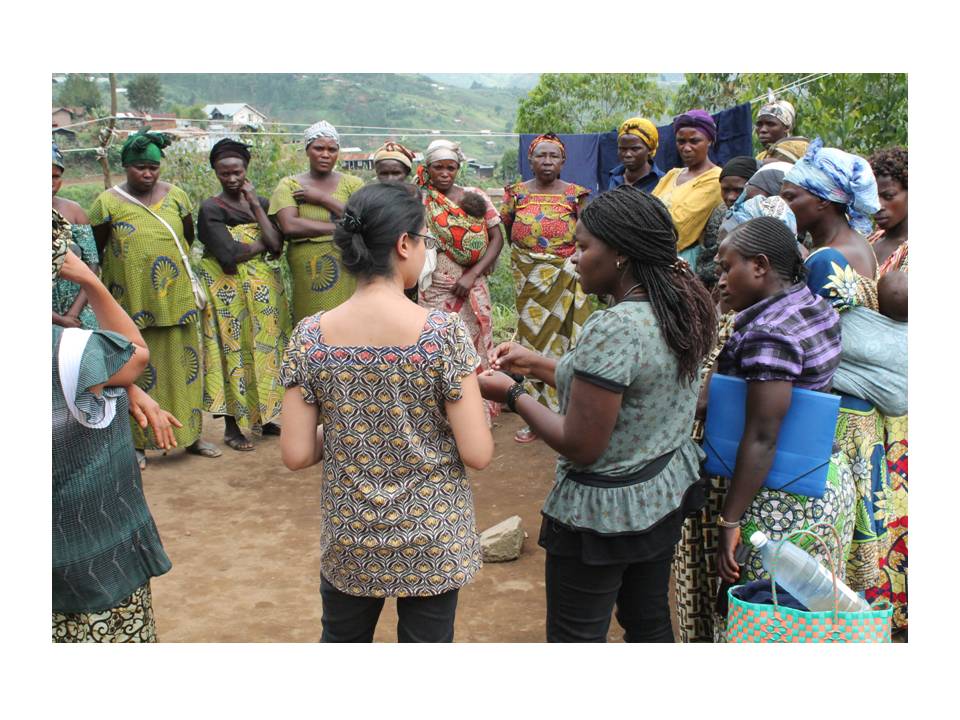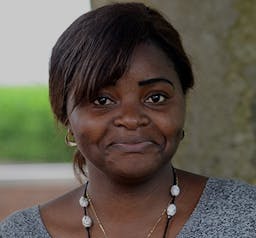Striving for Women's Rights in the DRC
Feb 26, 2020
Story

My name is Passy Mubalama, I am 29 years old and the founder of Action and Development Initiatives to protect women and children through AIDPROFEN association, a nonprofit organization based in Goma in eastern Democratic Republic of Congo (DRC). With AIDPROFEN association I campaign to promote Congolese women's rights in North Kivu, where I have been working as a human rights defender for 4 years.
Human rights violations in the DRC are numerous. Sexual violence, sexual slavery, torture, murder, trauma, genital mutilation, abduction, discrimination and other serious violations of women's rights have been reported for decades in DRC. Since 2009, through the AIDPROFEN association, I try to provide answers to some problems related to the violation of women's rights that remains a real challenge in the eastern DRC.
My limited resources do not allow me to touch many aspects of these problems but I do what I can to promote women's right in my country.
It is true that working as an advocate for human rights in general and being a women's rights defender in DRC, a country characterized by numerous armed conflicts, is not easy. In addition to my being a survivor of various forms of violence and discrimination in my society simply because I am a woman, the political and security situation in the DRC does not let human rights activists work in peace. Very often I am the target of armed groups and politicians who do not want the different violations of human rights committed by them to be reported.
What affects me the most is finding that the Congolese community still has a lot of prejudice against women and thinks they are weak. This is not the case because I am strong and very strong yet. Today, many people in DRC are still convinced that women cannot occupy decision-making positions like that of a national or provincial deputy,a school director, or university professor.
In the elections of 2006 and 2011 in the DRC, for example, I noticed that men and women did not trust women and have not voted for them. Also, the Congolese government has enacted legislation that advocates parities, but laws are fictitious and not implemented. Unfortunately, many women and girls under estimate and think they cannot play a role in public life. Further, women do not support each other to defend their rights.
"The wars perpetrated by various armed rebel groups present in the region, ethnic customs and traditions and conflicts are the main causes of most of these violations," says Gemima Maombi, the gender program manager of AIDPROFEN association in Goma.
Then and Now
I still remember that as a 10-year old in 1994, I witnessed things a child of my age could not bear - killings, people starving, domestic violence, and many cases of sexual violence, etc.. The story of the DRC that year was marked by a massive influx of Rwandan refugees on Congolese soil through Goma where I live. Unfortunately, most of these refugees who came to Congo were armed. The arrival of these people on Congolese soil, poor governance and a lack of leadership was the beginning of the insecurity that characterizes today my region.
Armed conflicts and wars that have succeeded in this period have worsened the situation of the Congolese women who were already in a precarious condition, due to customs and traditions that were biased. They suffered all the consequences of these wars and violations of human rights that are associated with it.
The events of 1994, successive wars and armed conflicts have caused numerous violations of women's rights. These include the War of the Alliance of Democratic Forces for the Liberation of Congo (AFDL) in 1997, the rebel Congolese Rally for Democracy (RCD) and the National Congress for the Defense of the People (CNDP) headed by Laurent Nkunda and Bosco Ntaganda. The latter is currently detained by the International Criminal Court for war crimes and crimes against humanities committed in eastern DRC in the most recent rebellion, the movement of March 23 called M23. This rebel group now controls some areas of the DRC like Rutshuru and Nyiragongo. The atrocities committed by the rebels in this part of the DRC have caused massive displacement of the population and many violations of women's rights.
According to a report published by the Office for the Coordination of Humanitarian Affairs, between 1st January 2009 and 25th June 2013, the Province of North Kivu had a total workforce of 967,050 Internally Displaced Persons. Many of them are women and children.
In addition to the wars and ethnic conflicts, that have characterized the region, customs and tradition also disadvantage women. Even before 1994, in my family and community, women were not respected by men. They could never air their views or make decisions in the family.
At that time in my neighborhood only one woman worked. She lived alone but was heavily criticized by the community and was described as a difficult woman. While women were submissive, they were beaten if they opposed the view of their husbands. That still shocks me. Unfortunately I was helpless and did nothing which my community found normal although I reject that idea.
In fact, I grew up seeing how women are abused by their husbands but are condemned by custom and traditions to keep silent. I decided to work hard at school and see how I could do something to change this situation, one day. I was often encouraged by my mother to go to school. She always told me, "Passy, you should not be like me. I dropped out of school to get married, but am suffering now. Do not focus on getting married although it may be good. But it is better when you have studied well, can work and be independent," All my life these words come back to me and give me the courage to do my best to help woman get out of this slavery.
I live in a world where there are many inequalities between men and women. Women are excluded in many things, in the name of custom and tradition, but I finally understand that men do not want their wives to work for fear of them becoming autonomous and independent.
I watched all these violations of our rights by men helplessly because I could not do anything at the time. So I decided to work hard to school. I always succeeded in school. When I obtained my degree in management development in 2009 at ISIG an institute for management in Goma DRC, I wanted to do something. I requested for an internship at a local radio station where I was hosting programs on women's issues and justice. I denounced the various violations of women's rights in my community. It was tough, as men did not always agree with me. They said, "I married my wife after ging dowry (cows, goats, campaigns, etc.) to her parents. I bought my wife and I can do all I want with her." But we were still divided on this issue.
Unfortunately, I noticed that most of these women were unaware of their rights, and are illiterate. Congolese law holds that a man is the only head of a household. A woman cannot work without the permission of her husband. She cannot decide whether or not she wants to have children. Women here do not know that these are violations of their rights.
When I finished my university studies in management development in 2009 at ISIG Goma a few female classmates of my age who had almost the same vision as me and wanted change things in our community, decided to start a women's association to promote our rights in our community. The organization was named Action and Development Initiatives to protect women and children AIDPROFEN association.
Through this organization, which had very little financial resources, we realized that the priority was to educate women about their rights and showing them how to claim them.
In Goma, I installed local Women's Committees (CLF) where we women gathered and discussed our rights. I tried to reflect on solutions to the problems of human rights violations against women. In these committees, we talked about how we could contribute to the establishment of peace in Eastern DRC. I also organized many conferences and awareness sessions with young students on the topics of women's right including husband's permission to work in the DRC and the issue of inheritance.
My organization is unfortunately too young and I lack enough financial resources to extend its important activities over the North Kivu province where numerous violations of human rights are still reported. In the coming days, we will continue to educate and inform women of their rights and urge them to report various violations, encourage small income generating activities in favor of women for their self-sufficiency and financial independence and create a learning and literacy school for women and single mothers to allow them to read and write. We will give them computer skills to enable them to use social media to make their voices heard, and conduct advocacy with the Congolese authorities about respecting and implementing the law on equality between man and woman.
Finally, we will work with other women in the world to unite with Congolese women to contribute to the peace process and the restoration of justice in the eastern DRC.
The work done by AIDPROFEN association is really appreciated by the public and particularly by women. "Your work is very important. It teaches us to know our rights and especially the claim if they are not respected", says Bibishe Kanane a woman beneficiary of AIDPROFEN activities and member of the local Women's Committee. As most of these women are in North Kivu, Bibishe want these activities be spread over the whole of the North Kivu province and train women in leadership to better defend their rights. Clarisse Zihindula, an AIDPROFEN association member thinks that Aidprofen must collaborate with other organizations that have a lot of experience to show us how to make gender equity and equality of opportunity and women's rights a reality in the DRC while sharing and exchanging experience.
The growing insecurity and repeated wars that characterize the eastern DRC region remains a major challenge that causes many human rights violations against women there. A solution is to create awareness among Congolese authorities on the question of women's right in the DRC. The struggle for the promotion of women's rights is not only for women; it is a responsibility of the community that concerns both men and women. This allows women who do not underestimate themselves to trustand support each other.
This article is part of a writing assignment for Voices of Our Future a program of World Pulse that provides rigorous digital media and citizen journalism training for grassroots women leaders. World Pulse lifts and unites the voices of women from some of the most unheard regions of the world.




